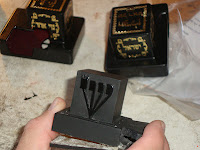Origin of Kitniyot Prohibition??
One of the greatest problems with the prohibition of kitniyot it that "al panav" the origin of the custom has been shrouded in mystery. It's not in Torah, Mishna, Yerushalmi or Bavli. It just seems to appear out of nowhere.
None of the contamination explanations or "marit ayin" really sit well with me (certainly not if eating pasta made from potato flour is OK). I recently stumbled across this interesting tidbit by
Rabbenu Manoah (Provence, ca. 1265) in his commentary on Maimonides (Laws of Festivals and Holidays 5:1):
None of the contamination explanations or "marit ayin" really sit well with me (certainly not if eating pasta made from potato flour is OK). I recently stumbled across this interesting tidbit by
Rabbenu Manoah (Provence, ca. 1265) in his commentary on Maimonides (Laws of Festivals and Holidays 5:1):
"It is not proper to eat qitniyot on holidays because it is written (in Deut. 16:14) that ‘you shall rejoice in your festivals’ and there is no joy in eating dishes made from qitniyot."



Comments